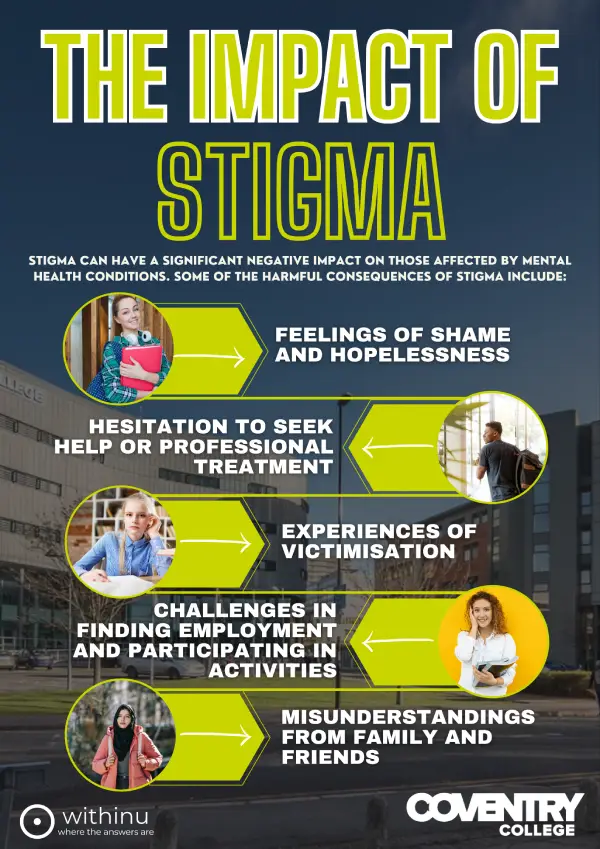
Stigma can have a significant negative impact on those affected by mental health conditions. There are two types of stigma to be aware of:
Social stigma refers to the unfavourable treatment and unfavourable attitudes that society and/or individuals may have towards those who are dealing with mental health conditions. One extreme example of a societal stigma is the false belief that “all people with mental health problems are violent and dangerous.” It’s imperative that we challenge any misconceptions and create a society that is more understanding and accepting of everyone.
Self-stigma is when people with mental health conditions internalise unfavourable ideas about their condition and take them as true. Self-stigma can cause people to delay or avoid seeking help because they are afraid of being rejected or made to look and feel bad. We need to encourage individuals who are struggling with mental health challenges to see their value and see that they too, deserve care and assistance and that we all have mental health, so they are not alone.
Some of the harmful consequences of stigma include:
1. Feelings of shame and hopelessness
2. Hesitation to seek help or professional treatment
3. Experiences of victimisation
4. Challenges in finding employment and participating in activities
5. Misunderstandings from family and friends
To combat stigma effectively on campus and in your daily life, there are several practical steps you can take:
Speaking Up: When you hear misconceptions about mental health, challenge them respectfully. For example, if someone suggests that anxiety is “just being dramatic,” you might share that anxiety disorders are legitimate medical conditions that affect millions of people worldwide.
Language Matters: The words we choose can either perpetuate or help eliminate stigma. Instead of saying someone “is bipolar,” say they “have bipolar disorder” – putting the person before the condition. Avoid using mental health conditions as casual adjectives, like describing ordinary organisation preferences as “being OCD.”
Education and Awareness: Mental Health First Aid courses can help you better understand various conditions and how to support others. These courses can be particularly valuable for student leaders.
Understanding Your Rights: In the UK, mental health conditions are protected under the Equality Act 2010. This means you have legal rights regarding support and reasonable adjustments in your education and future employment. You cannot legally be discriminated against for having a mental health condition.
Social Media and Mental Health: While social media can sometimes perpetuate stigma, it can also be a powerful tool for change. Many students find supportive communities through mental health advocacy accounts and organisations online. However, it’s important to ensure these spaces are legitimate and promote healthy discussions rather than harmful behaviours.
Remember that seeking help is a sign of strength, not weakness. Many successful students and professionals manage mental health conditions while pursuing their goals. Your mental health challenges don’t define your potential or limit your future opportunities.


